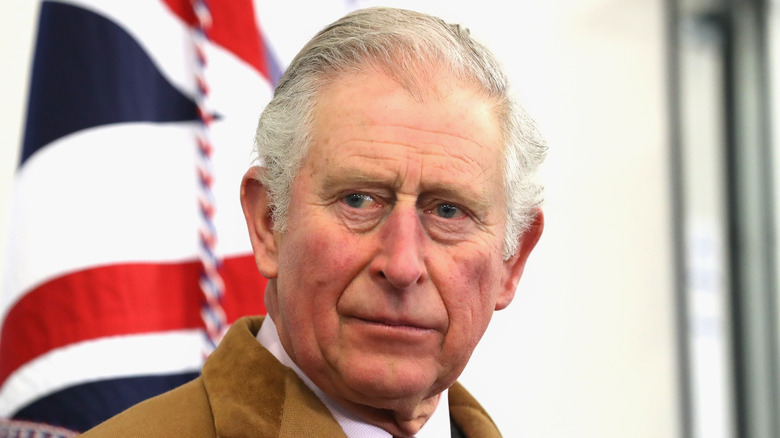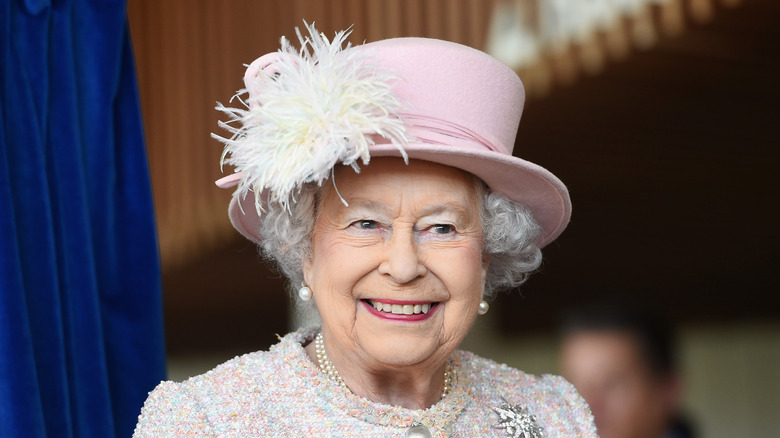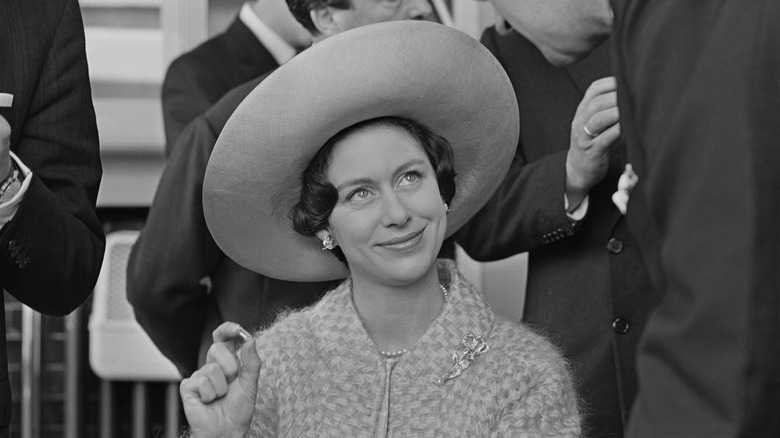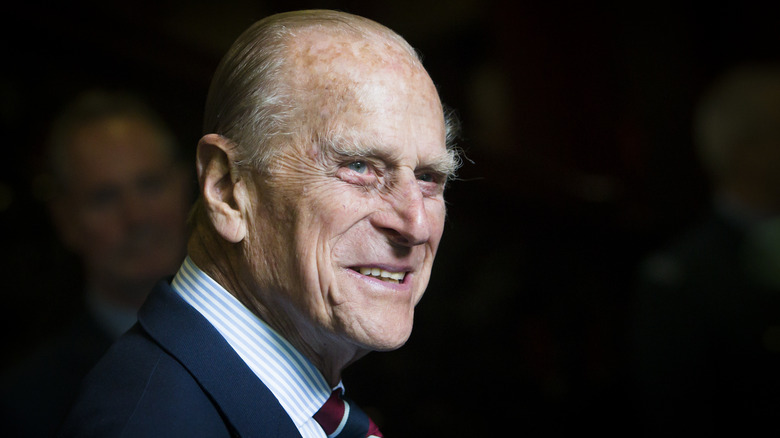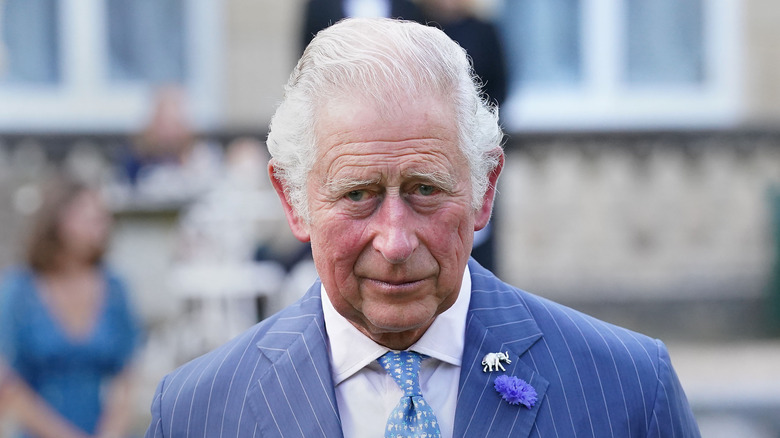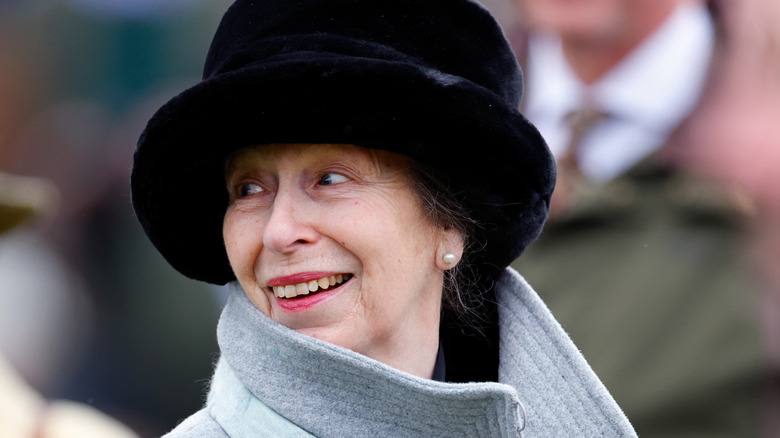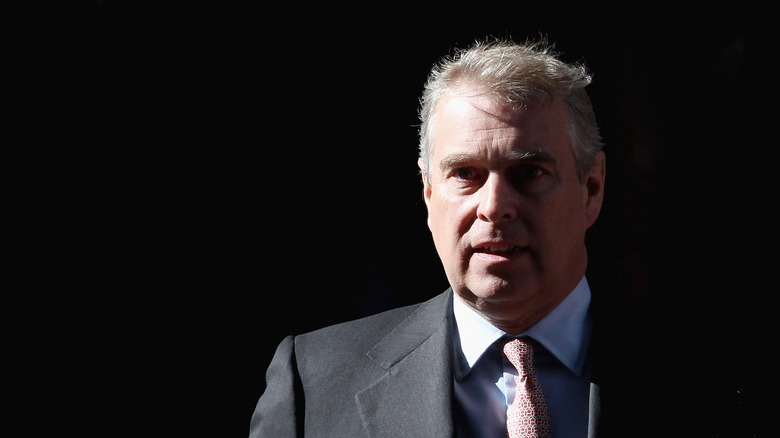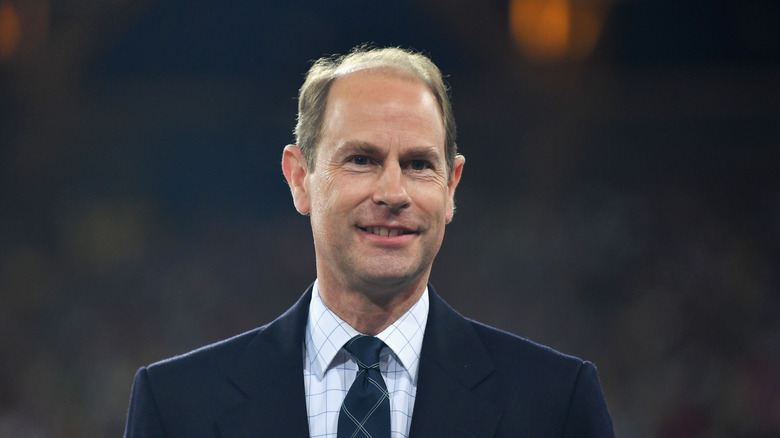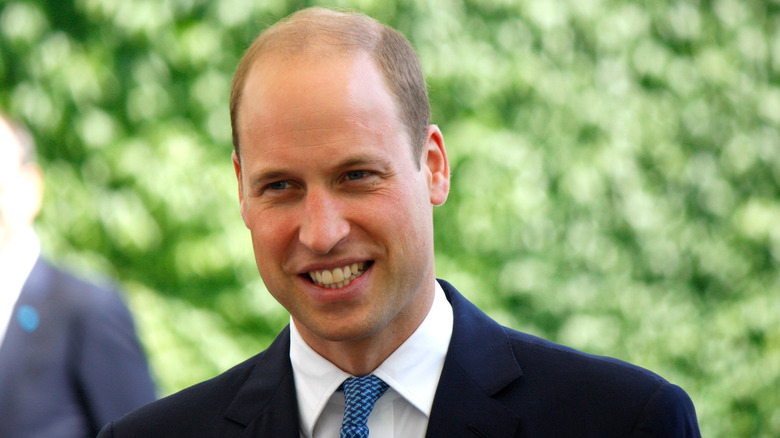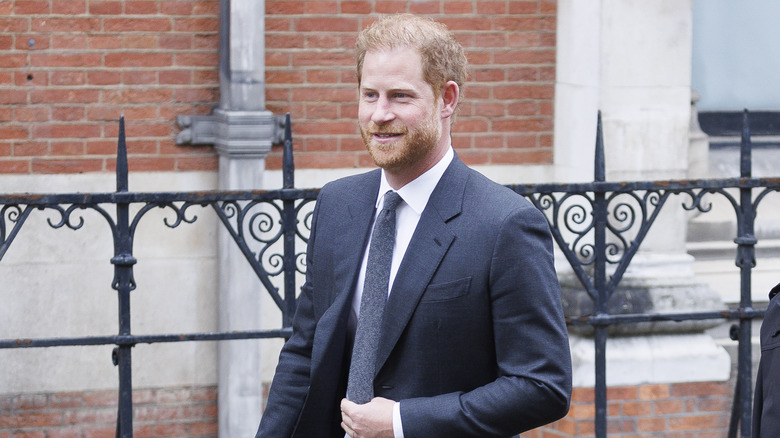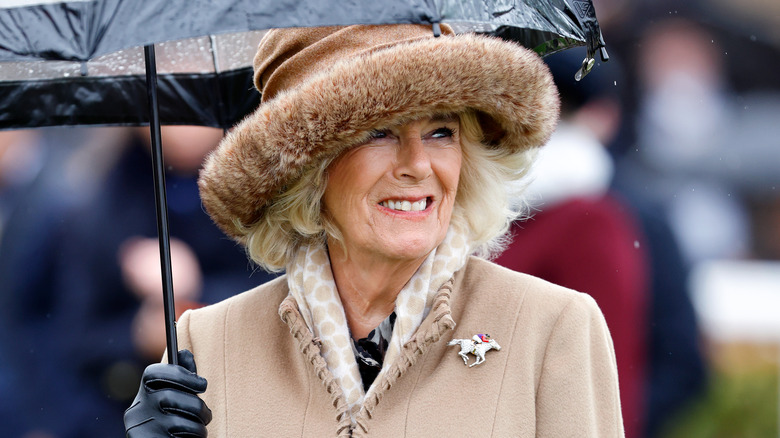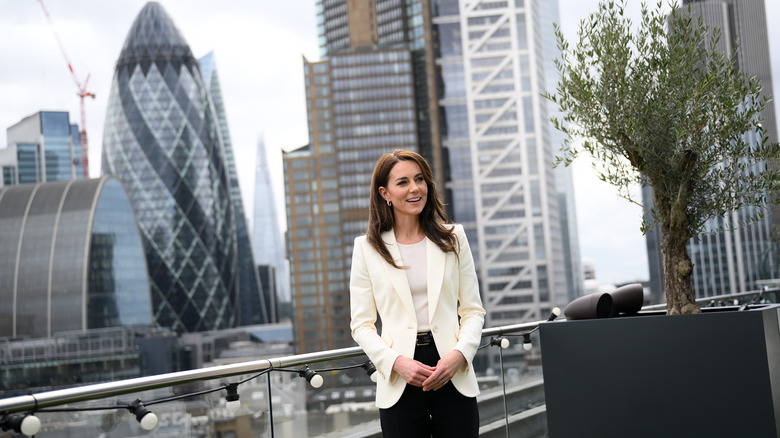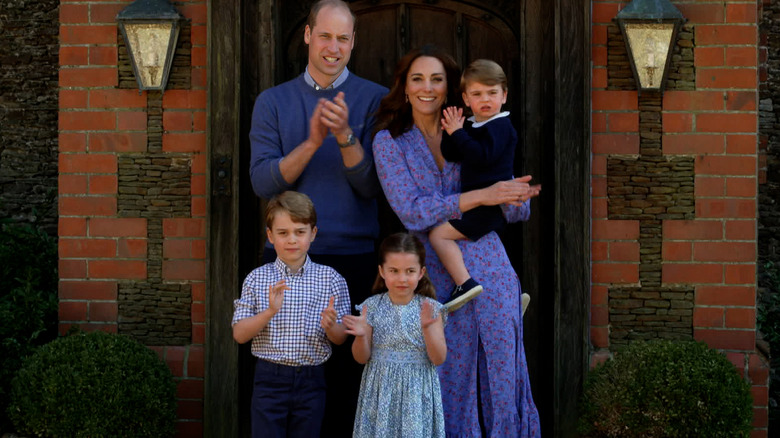This Is How Far The British Royal Family Really Got In School
We may receive a commission on purchases made from links.
Though they no longer serve the people of Great Britain as political leaders, the members of the royal family still have immense influence over their supporters and subjects. From the charities they choose to support to their fashion statements to the subtle ways they nod in the direction of political action — King Charles III's comments on the environment are a great example of this — the members of the firm have to make sure they are well informed. Royals must be educated on issues that are at the forefront of conversation and need to be in tune with how to respond in a way that is relevant and in touch.
Of course, the royal family members can read up on the pressing issues of the times in the newspapers or online just like the rest of us, but given their heightened stature, it's no wonder that many have sought out high levels of education before carrying out their duties.
For example, Prince William carved his own path at university before embarking on his duties as the new direct heir to the British throne. His brother, Prince Harry, took a different approach and dedicated himself to a long-standing military career after his education at Eton College. From the late Queen Elizabeth II to her sister, Princess Margaret, and many royals in between, education has been both a valued aspect of life within the firm and a privilege not everyone has been granted.
Queen Elizabeth II was taught mostly by tutors
When a young Princess Elizabeth was growing up, her entire life was turned upside down by two cataclysmic events — the abdication of her uncle, King Edward VIII, and World War II. The former put her in direct line to the British throne, and the latter endangered the entirety of Europe and forced Elizabeth into the countryside for safety. While evacuated at Windsor Castle, Elizabeth's education was carried on at the hands of tutors despite the circumstances, and as time went on and the future queen's life was back on track, her schooling took on a heightened level of importance.
Similarly to many young girls from aristocratic families, Elizabeth was educated mostly at home, as schooling was still very male dominated in the 1940s and 1950s. Still, her future role as queen heightened the level of importance within her education, and she spent much of her time with her father, King George VI, learning the ropes of the job. Henry Marten, who was the then-vice-provost of Eton College also tutored the then-princess, and she further received education from the Archbishop of Canterbury.
Pursuing even more academic areas with a governess, the future queen learned French in addition to her studies in politics and history, greatly setting her up for success as the monarch.
Princess Margaret didn't experience the same level of education as her sister
While then-Princess Elizabeth was granted an extensive educational experience, thanks to her direct position within the line of succession, her younger sister, Princess Margaret, did not enjoy such privileges. In the BBC documentary "Princess Margaret: The Rebel Royal," Margaret's former lady-in-waiting, Lady Anne Glenconner, said she believed her education was put on the back burner in order to serve Elizabeth wholeheartedly.
"[Princess Margaret] always said, 'I was never educated as well as my sister in order not to be a sort of threat to her,' that's what she felt," Glenconner detailed of Margaret's education (via the Daily Mail). "The queen had people from Oxford and Eton who came and taught her and Princess Margaret had a French governess and someone who taught her how to play piano."
Glenconner's estimations about Margaret's education — or lack thereof — were furthered by another lady-in-waiting, Jane Stevens, who highlighted just how aware Margaret was of the lack of interest in her own educational pursuits. "She said to me, 'That was the first time I sort of thought or realized that my sister was going to be queen and I wouldn't really be part of what she was going to do.' It hit her quite hard that their lives were going to be completely different," Stevens said.
Prince Philip excelled as a young student
To say that the late Prince Philip's life started in turmoil is a huge understatement. Though known for his life's work as the longest-serving consort in royal history, Philip's early years in Greece were fraught with chaos. After his father was imprisoned and his uncle abdicated from the Greek throne, Philip was forced to evacuate the country. At just 18 months old, Philip was placed in a cot — made from a box — and placed on the Royal Navy ship leaving Corfu. Bouncing around from home to home and having to flee his home country, you'd think that Philip's early education would've taken a hit, but think again. The prince excelled as a student despite the disruptions that plagued his early years, and he threw himself into life as an academic quite naturally.
By the mid-1920s, Philip was living in France and started attending school there, before moving to England and enrolling at Cheam Preparatory School in Surrey. By the age of 12, he was on the move again — this time to Germany — where he studied under academic Kurt Hahn at Salem School.
Shortly thereafter, Philip attended the Gordonstoun School — located in Britain but founded by Hahn — where he became the captain of the hockey and cricket teams as well as the head boy. He also excelled in sailing during his time at Gordonstoun, and his sons would later follow in his enrollment footsteps.
King Charles III had a particularly tough time while attending boarding school
Though his father, Prince Philip, was incredibly successful in his schooling pursuits and particularly at Gordonstoun School, King Charles III cannot say the same. A famously shy child who expressed far more emotion than his father seemingly cared for, Charles attended boarding school at the age of 13 and quickly took an interest in art and the environment. But it was the constant bullying he faced that defined Charles' experience at Gordonstoun. Writer William Boyd — who attended Gordonstoun at the same time as Charles – further expressed that the now-king saw his time at boarding school as akin to imprisonment (via Reuters).
Charles' experience at boarding school was further discussed by Jonathan Dimbleby, who wrote an extensive biography of Charles entitled "The Prince of Wales: A Biography." Dimbleby outlined how the bullying shaped the man that Charles would become. "As an adult, [Charles] would insist that the decision to send him to Gordonstoun, which at the time he regarded as a prison sentence, was in fact beneficial, instilling in him the self-discipline sense of responsibility without which he might have 'drifted,'" he wrote. Dimbleby even recalled the young prince's account of the bullying. "The people in my dormitory are foul," Charles reportedly said while enrolled at Gordonstoun. "They throw slippers all night long or hit me with pillows ... I still wish I could come home."
Princess Anne excelled in school and is an advocate of the boarding upbringing
Though her brother faced an awful amount of torment while at boarding school, his sister Princess Anne, thrived in the environment. Often seen as the unwavering member of the royal family who is all business, Anne attended the Benenden School located in Kent, and now serves as the president of the Benenden School Society. She spoke about her experience as a boarder during an extensive interview with Vanity Fair, highlighting the differences between her education and Charles' and how she was ready to take on life as a boarding school student.
"I was ready to go to school. I had a governess and two friends and that was never going to be enough, really, so I was only too pleased to be sent off somewhere else," Anne detailed, before expressing her thoughts about the boarding school way of life and how it has entered the 21st century.
"I think boarding school has been demonized by some when in fact it's a very important aspect to have available and many children actually thrive in it," Anne continued. "One of the other charities I got involved with was the Royal Wanstead Foundation, which is now the Royal National Children's SpringBoard Foundation and takes children from chaotic homes and sends them to boarding schools. You only have to listen to them to realize that it's absolutely transformed their lives."
Prince Andrew studied abroad as a student
When Queen Elizabeth II and Prince Philip's children were in their schooling years, most of them ended their educational career at their respective boarding schools — Gordonstoun School for then-Prince Charles, Prince Andrew, and Prince Edward, and Benenden School for Princess Anne. As far as Andrew's schooling experience is concerned, he followed a relatively similar path while also expanding his education beyond Great Britain.
Like his siblings, Andrew was largely educated by a tutor as a young child growing up at Buckingham Palace, but after attending primary school, he enrolled at Gordonstoun. How his path differed, however, was that he also spent time abroad, attending Lakefield College School in Ontario, Canada, before his schooling time was up. Taking things one step further than his father and older brother, Andrew then enrolled at the Britannia Royal Naval College in 1979, starting his career as an officer in the Royal Navy. Once that portion of his school was complete, Andrew completed pilot's training and capped off his complete schooling in 1981 when he earned his pilot's wings. Of course, Andrew — known for his problematic friendship with convicted sex offender Jeffrey Epstein — had his military titles stripped due to the ongoing scandal involving him, accuser Virginia Giuffre, and the settlement paid to her. Andrew has largely retreated from royal life as of publication.
Prince Edward went far in school before joining the armed forces
Prince Edward is definitely the baby of the royal kids — and given that he is quite far away from the throne, he has enjoyed educational opportunities and professional paths. Like his father and two older brothers, Edward enrolled at Gordonstoun School and boarded there as a teen, before furthering his education at Jesus College at Cambridge. Edward studied history while at the school, and similarly to Prince Andrew, later pursued a career in the armed forces. Instead of the Royal Navy like his brother and father before him, Edward chose the Royal Marines and maintained his commission until 1987, before making the decision to retire.
Though his education followed a similar path to what his brothers and father had done before him, Edward pursued a number of professional interests given that his role as a member of the royal family was of lesser magnitude than King Charles III. Studying under famed composer Andrew Lloyd Webber, Edward went on to work in the theater community and set up his own production company in the late 1980s. After that venture left Edward a bit strapped for cash — and by a bit, we mean about $1 million in debt — he then made strides toward the film industry. These days, Edward's role in the royal family has expanded, but he has always seemed to march to the beat of his own drum.
Prince William had a very well-rounded education
Here's where royal education seems to shift — albeit due to generational differences and access to education. Prince William, the now Prince of Wales, has had an impressive educational path and has gone farther than most of his family members — no doubt due to his role as the now direct heir to the throne and the expansion that academic institutions have had since his father and grandfather's era.
His mother, the late Princess Diana, was adamant that William had as normal of a schooling experience as possible, so he was enrolled at the Wetherby School in London as a young student. After his time there was over, William enrolled at the Ludgrove School in Berkshire and was there for five years before attending the prestigious Eton College.
Famously, William then enrolled at the University of St. Andrews in Scotland in the early 2000s. While there, he studied geography and art history, before spending a year traveling and working for charities that his mother aligned herself with during her lifetime. After graduating in 2005, William took things one step further and enrolled in the Royal Military Academy Sandhurst. Though he did not serve foreign tours during his time in the military, William was later trained as a helicopter pilot and completed armed forces service as an RAF Search and Rescue Force officer.
Prince Harry followed in his brother's footsteps before he joined the military
Unsurprisingly, Prince Harry's educational path looks quite similar to that of his older brother, Prince William, but there is a bit of variation. Like William, Harry was a student at a number of private schools before attending Eton College. After studying there and graduating in 2003, Harry decided to travel and work rather than expand his schooling — as William had done at St. Andrews — which led him to Argentina, Africa, and Australia. During this period of his life, Harry spent the bulk of his time working at an orphanage in Lesotho, a meaningful connection in his life that he has maintained to this day.
After this period of time came to an end, Harry decided to pursue a career in the military and enrolled at Sandhurst, the famed military academy responsible for Britain's army officers. He graduated in May 2005 and became an officer in April 2006. When he did so, British military officials made their hesitations clear about him serving overseas, however. Given Harry and William's heightened profiles as members of the royal family, military leaders were concerned that their presence in overseas territories would put their fellow service members at risk. Though William took this to heart and contained his service to Great Britain, Harry went on to serve two tours in Afghanistan. He has continued to advocate for service men and women to this day.
Camilla, Queen Consort went international for her educational pursuits
Camilla, Queen Consort had a more limited educational experience being the young, female child of an aristocratic family. Camilla's family was — despite their reputation and connection to past royal affairs — an upper-class, well-to-do bunch and Camilla spent most of her childhood at the family's country estate, located in East Sussex. It was there that she discovered her love of equestrian-related sports and all things outdoors, two passions that have carried on to this day. After spending time at the estate, Camilla attended the Queen's Gate School located in London but her role as an up-and-coming lady put a bit of a wrench in her academic pursuits.
After Queen's Gate School, Camilla's family sent her to Switzerland where she attended finishing school — the poshest education about how to be a lady. From there, she went to the University of London Institute located in Paris, before returning to Great Britain. In 1965, she was presented to society as a debutante, and her life as an upper-class girl ready to get married officially took off. Camilla later worked as a receptionist while indulging in the London social scene, before getting married to her first husband, Andrew Parker Bowles.
Princess Catherine has an impressive educational background
Times, thankfully, have changed since the daughters of upper-class families have been seen for their potential as wives rather than academic thinkers themselves. Princess Catherine is a great example of this due to her familial background as well as the impressive education she received. Due to her parents' successful business and heightened roles within their community, Catherine attended prep school and later Marlborough College located in Wiltshire, England. While at Marlborough, Catherine excelled both academically and athletically, becoming the captain of the field hockey team and establishing herself as a very secure student.
After completing her time at Marlborough, Catherine went on to apply and be accepted to the University of St. Andrews. There, she studied art history — and just so happened to meet a fellow art history student, Prince William. The two lived together as friends before taking their relationship to the next level, and of course, the rest is history.
After leaving St. Andrews, Catherine worked in the fashion industry as well as for her parents' company, while also establishing herself with a number of charities. Her nonprofit work has continued tenfold as her time in the royal family has grown and her role expanded. Catherine is now seen as one of the most approved of and beloved members of the firm.
The royal children are following a new path when it comes to their schooling
As the royal family continues to grow, much attention has been paid to the education that Prince William and Princess Catherine are affording their three children, Prince George, Princess Charlotte, and Prince Louis. When he was just the cutest little guy, George was enrolled at St. Thomas's School located in Battersea, as the family was living at London's Kensington Palace at the time. However, as their children grew and the couple expressed their desire to give them as normal of a childhood as possible, William and Catherine relocated to Windsor — outside the craning eyes of London — and enrolled their children at the Lambrook School.
"The Duke and Duchess of Cambridge have today announced that Prince George, Princess Charlotte and Prince Louis will attend Lambrook School in Berkshire from September 2022," Kensington Palace said at the time (via Town & Country), announcing the couple's decision to move out of the city. "Their Royal Highnesses are hugely grateful to Thomas's Battersea where George and Charlotte have had a happy start to their education since 2017 and 2019 respectively and are pleased to have found a school for all three of their children which shares a similar ethos and values to Thomas's."
As for Prince Harry and Meghan Markle's children, Prince Archie and Princess Lilibet, their schooling in the United States has yet to be established given their young ages.
